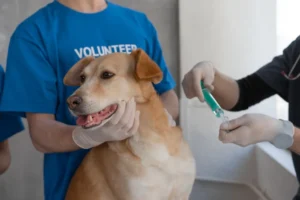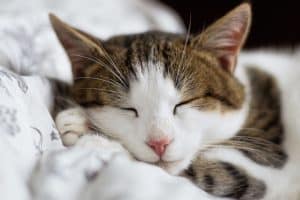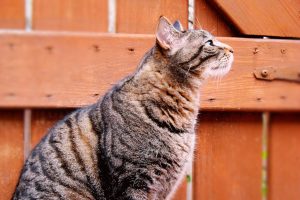Vaccinations play a vital role in protecting our feline friends from a range of serious diseases.
It’s essential for every cat owner to understand the importance of timely vaccinations and boosters.
In this guide, we’ll discuss the fundamentals of cat vaccine schedules, the significance of timing, and how to customize a vaccination plan to ensure your pet stays happy and healthy. Stay tuned as we navigate the world of cat vaccines together, one paw at a time.
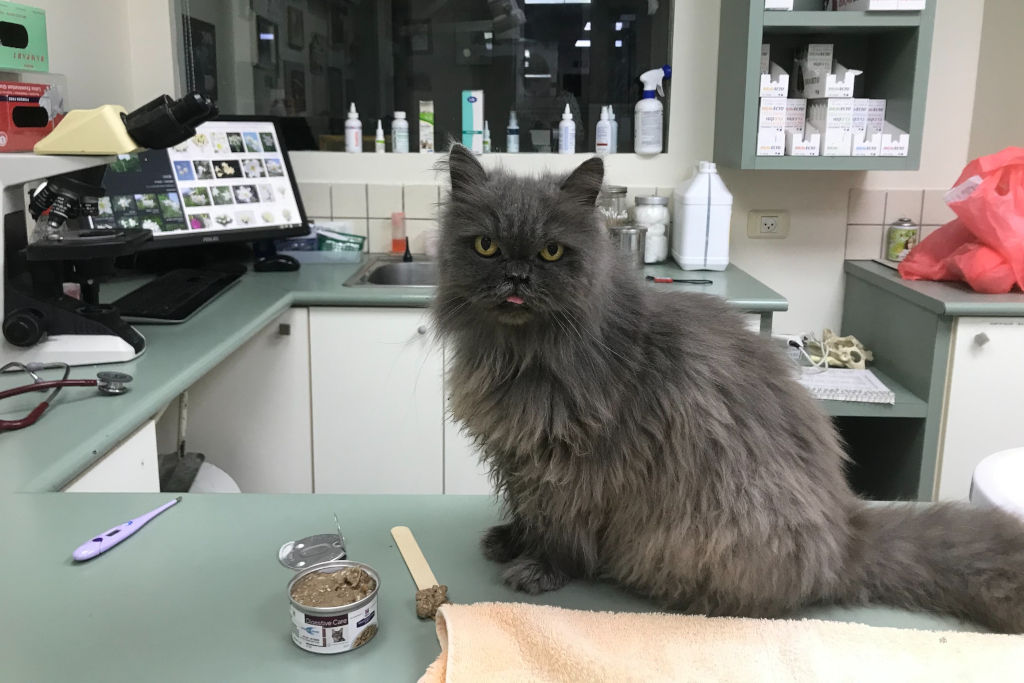
The Basics of Cat Vaccines
When it comes to cat vaccines, it’s essential to understand the difference between core and non-core vaccines.
Core vaccines are those recommended for every cat, regardless of their lifestyle or location, as they protect against widespread, severe diseases. Non-core vaccines, on the other hand, are tailored to specific risks based on factors such as the cat’s environment and geographical region.
Vaccines work by stimulating your cat’s immune system to recognize and fight off harmful pathogens. They contain harmless versions of the disease-causing organisms, allowing your cat’s immune system to build a strong defense without actually causing illness.
While vaccines are generally safe, it’s worth noting that some cats may experience mild side effects like lethargy or a slight fever.
However, these effects are typically short-lived and far outweigh the risks of leaving your cat unprotected against dangerous diseases.
Why Timing and Boosters are Important
The timing of vaccinations and boosters is crucial to maintaining your cat’s health and well-being. Following a proper schedule ensures that your cat’s immunity remains strong over time, safeguarding them from life-threatening diseases.
Sticking to a recommended schedule also helps reduce the risk of adverse reactions, as administering vaccines too close together can sometimes lead to complications. By following the advised timeline, you can ensure your cat receives optimal protection without jeopardizing their health.
Timely vaccinations and boosters are integral to supporting your cat’s overall well-being. A well-vaccinated cat is less likely to fall prey to preventable diseases, contributing to a longer, healthier life.
It’s important to recognize that several factors can affect vaccine schedules and booster frequency, including your cat’s age, health status, and lifestyle. Being aware of these factors will enable you to work with your veterinarian to tailor a vaccination plan that best meets your cat’s individual needs.
Vaccination Schedule Basics: Age-Specific Recommendations
Navigating vaccination schedules can be a bit daunting, but understanding age-specific recommendations can help you keep your cat protected at every stage of life.
Kitten vaccinations
Starting off on the right paw is crucial for your kitten’s health.
Vaccinations typically begin when kittens are around 6-8 weeks old, followed by a series of boosters every 3-4 weeks until they reach 16-20 weeks of age.
During this period, kittens will receive core vaccines like feline panleukopenia, feline calicivirus, and feline herpesvirus type 1. Additionally, a rabies vaccination is administered, usually around 12-16 weeks old.
Your veterinarian may also recommend non-core vaccines based on your kitten’s specific risk factors.
Adult cat vaccinations
Once your cat reaches adulthood, the frequency of vaccinations changes.
Core vaccines are typically given every 1-3 years, depending on the specific vaccine and your cat’s lifestyle.
For example, the feline panleukopenia vaccine might require a booster every three years, whereas the feline calicivirus and feline herpesvirus type 1 vaccines might be given annually. Rabies vaccinations may also follow a 1-3 year schedule, depending on local regulations and the vaccine used.
Non-core vaccines, if needed, will be administered based on your cat’s risk factors and the duration of immunity provided by each vaccine.
Remember, it’s essential to work closely with your veterinarian to determine the most suitable vaccination schedule for your cat, taking into account their age, health status, and lifestyle.
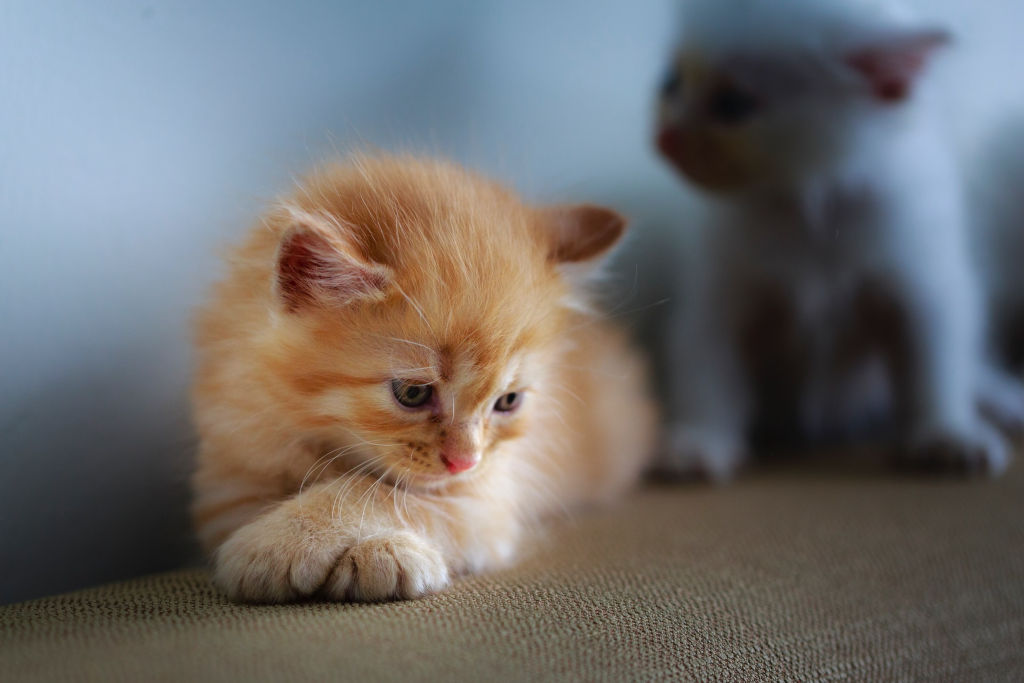
Factors Affecting Vaccine Schedules and Booster Frequency
When determining your cat’s vaccination schedule and booster frequency, there are several factors to consider. By understanding these factors, you can collaborate with your veterinarian to tailor a vaccination plan that best meets your cat’s individual needs.
Cat’s age, health status, and lifestyle
A cat’s age plays a significant role in determining the appropriate vaccination schedule. As discussed earlier, kittens and adult cats have different vaccination requirements.
Additionally, a cat’s health status can influence the necessity and frequency of certain vaccines. For example, immunocompromised cats or those with chronic health conditions may require a modified vaccination plan.
Finally, your cat’s lifestyle, such as whether they’re indoor-only, outdoor, or a mix of both, can affect their exposure to certain diseases and, consequently, the recommended vaccines.
Vaccine types and their duration of immunity
Core and non-core vaccines offer varying levels of protection, with some providing longer-lasting immunity than others.
For instance, the feline panleukopenia vaccine generally provides immunity for three years, while the feline leukemia vaccine may need a booster every one to two years.
Understanding each vaccine’s duration of immunity can help you and your veterinarian determine the optimal booster frequency for your cat.
Regional risks and local regulations
The prevalence of specific diseases and the presence of regional risks, such as local wildlife or climate conditions, can influence your cat’s vaccination requirements.
For example, in areas with a high prevalence of feline leukemia, your veterinarian may recommend vaccinating your cat against this disease.
Additionally, local regulations may dictate the frequency of certain vaccinations, such as rabies. Make sure you’re aware of any legal requirements in your area and consult with your veterinarian for guidance.
Indoor vs. outdoor cats
Indoor cats generally have a lower risk of exposure to infectious diseases compared to outdoor cats. However, this doesn’t mean that indoor cats can skip vaccinations altogether.
Core vaccines are still essential for all cats, while non-core vaccines should be considered based on the specific risks and circumstances of each cat.
In the case of outdoor cats, regular check-ups and booster vaccinations for non-core vaccines, like feline leukemia, are particularly important due to their increased risk of exposure.
By taking these factors into account, you can work closely with your veterinarian to develop a customized vaccination plan that ensures your cat receives the protection they need while minimizing the risk of adverse reactions.
Customizing your cat’s vaccination plan
Creating a customized vaccination plan for your cat involves several steps that aim to address your pet’s unique needs.
Collaborating with your veterinarian
Working closely with your veterinarian is crucial when creating a customized vaccination plan for your cat. Your vet has the expertise to assess your cat’s overall well-being, taking into account factors such as age, health status, lifestyle, and regional risks.
Keep the lines of communication open, and don’t hesitate to ask questions or discuss concerns about your cat’s health.
Evaluating individual risk factors
Each cat’s lifestyle and environment influence the vaccination decisions you’ll need to make.
Factors such as exposure to other cats, access to the outdoors, and regional disease prevalence play a role in determining which non-core vaccines your cat may need.
For example, cats living in a multi-cat household or boarding in a cattery are more likely to be exposed to infectious diseases due to close contact with other cats.
Additionally, if you reside in an area with a high prevalence of specific diseases, such as feline leukemia or feline immunodeficiency virus, your veterinarian may recommend additional non-core vaccines to protect your cat.
It’s essential to discuss these factors with your vet to ensure your cat’s vaccination plan is tailored to their unique needs and environment.
Considering titer testing
Titer testing measures the levels of antibodies in your cat’s blood, which can indicate their immunity to specific diseases. If you’re concerned about over-vaccination or want to ensure that your cat’s immunity remains strong, you can discuss titer testing with your veterinarian.
While not a replacement for legally required vaccinations, it can be a useful tool in determining whether a booster is needed or if your cat’s immune system remains strong.
Keep in mind that titer testing may not be appropriate for all cats or in all situations, so consult with your vet to determine if it’s a suitable option for your cat.
Common Misconceptions About Cat Vaccines
Dispelling common misconceptions about cat vaccines is an essential part of ensuring your feline friend stays healthy and protected. Here are a few widely-held misunderstandings and the truth behind them (click on the questions below to reveal the answers):
Indoor cats don’t need vaccinations.
While indoor cats may have a lower risk of exposure to certain diseases, they can still be vulnerable. For instance, some viruses can be brought into the home on clothing or shoes, and even brief encounters with other animals can pose a risk. Vaccinating your indoor cat is a crucial safeguard against preventable diseases.
Vaccines cause more harm than good.
Vaccines have significantly reduced the prevalence of severe feline diseases, and their benefits far outweigh the risks. While some cats may experience mild side effects, severe reactions are rare. Your veterinarian will take your cat’s individual needs and risk factors into account when determining the best vaccination plan.
Once vaccinated, my cat is protected for life.
Vaccines provide protection for a limited time, and immunity can wane as time passes. This is why boosters are essential for maintaining your cat’s immunity. By following a recommended vaccination schedule, you can ensure your cat stays protected throughout their life.
All cats need the same vaccines.
While core vaccines are recommended for all cats, non-core vaccines are determined based on your cat’s individual risk factors. It’s essential to work with your veterinarian to develop a customized vaccination plan that suits your cat’s specific needs and lifestyle.
The Limits of Cat Vaccines
Vaccines are an essential part of protecting your cat’s health, but they don’t provide 100% protection.
Some cats may not respond well to vaccines, and others may still be susceptible to infection even if they’ve been vaccinated. To ensure your cat is as protected as possible, follow your veterinarian’s recommended vaccination schedule and booster frequency, and practice good hygiene.
If you’re concerned about your cat’s vaccine protection, talk to your veterinarian about titer testing to measure immunity levels and determine if a booster vaccine is needed.
Wrap-Up: Cat Vaccine Schedules and Boosters
Wrapping up our discussion on cat vaccine schedules and boosters, it’s clear that the key to your feline companion’s long-lasting health lies in a proactive approach.
By staying informed and working closely with your veterinarian, you can create a tailored vaccination plan that addresses your cat’s unique requirements. Emphasizing timely vaccinations, regular boosters, and dispelling common misconceptions, you’ll be ensuring your cat thrives throughout their lifetime.
Tip: To stay on top of your cat’s vaccination schedule, consider setting reminders for upcoming appointments or maintaining a vaccination record to ensure they’re up to date.
By being a responsible and well-informed cat owner, you play an integral role in contributing to their well-being and happiness. To learn more about responsible cat ownership, check out our other guides for cat owners.
Alex, a passionate animal lover, has experience in training and understanding animal behavior. As a proud pet parent to two dogs and three cats, he founded AnimalReport.net to share insights from animal experts and expand his knowledge of the animal kingdom.

